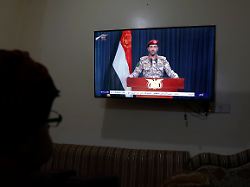Tanker “Strinda” fired upon
Houthi attack threatens security of key trade route
December 12, 2023, 4:55 p.m
The consequences of the missile attack on a tanker in the Red Sea could be much more serious than it first seemed. There is now a risk of delays on the busy trade route – with consequences for the supply chains.
Experts warn of serious consequences for the German economy as a result of increasing attacks on international shipping in the Red Sea. “The recent terrorist threats to shipping in the Red Sea are exacerbating the risk of supply chain disruptions for the German economy as well,” said the head of foreign trade at the German Chamber of Commerce and Industry (DIHK), Volker Treier.
“As the most open economy of the G7 countries, Germany is particularly dependent on functioning supply chains.” More than ten percent of all world trade passed through the Red Sea. The Kiel Institute for the World Economy (IfW) also expects consequences for domestic companies. “In the event of recurring attacks, transport costs are likely to rise initially because insurers will charge higher premiums and shipping companies will take expensive security measures,” said IfW trade expert Vincent Stamer.
After all, the additional costs for consumers should be limited. “Since transport costs only make up a fraction of the value of the goods, end customers are unlikely to notice much,” said Stamer. Price increases of up to 0.5 percent would be expected for cheap products. “For expensive products such as electronic goods, surcharges of 0.1 percent should not be significant,” added the retail expert.
Tanker “Strinda” fired upon
The Houthi rebels in Yemen say they have again attacked a cargo ship near the Red Sea in response to the Israeli military offensive in the Gaza Strip. The Iranian-backed militia said the Norwegian chemical tanker Strinda was fired upon after the crew ignored all warnings. It announced that it would continue to block ships from entering Israeli ports until Israel allows food and medical aid to enter the Gaza Strip.
The Shiite organization wants to support the radical Islamic Palestinian group Hamas in the war against Israel, which is also supported by Iran. The weakening global economy has already affected world trade this year: According to the International Monetary Fund, it will only grow by 0.9 percent, after an average of 3.5 percent between 2010 and 2020.
“A quarter of German companies at their international locations see supply chain disruptions as a risk to their business development,” says DIHK expert Treier in response to a survey by the Foreign Chambers of Commerce. “The current security policy challenges in the Red Sea have an additional negative impact on the international division of labor and cooperation.”
